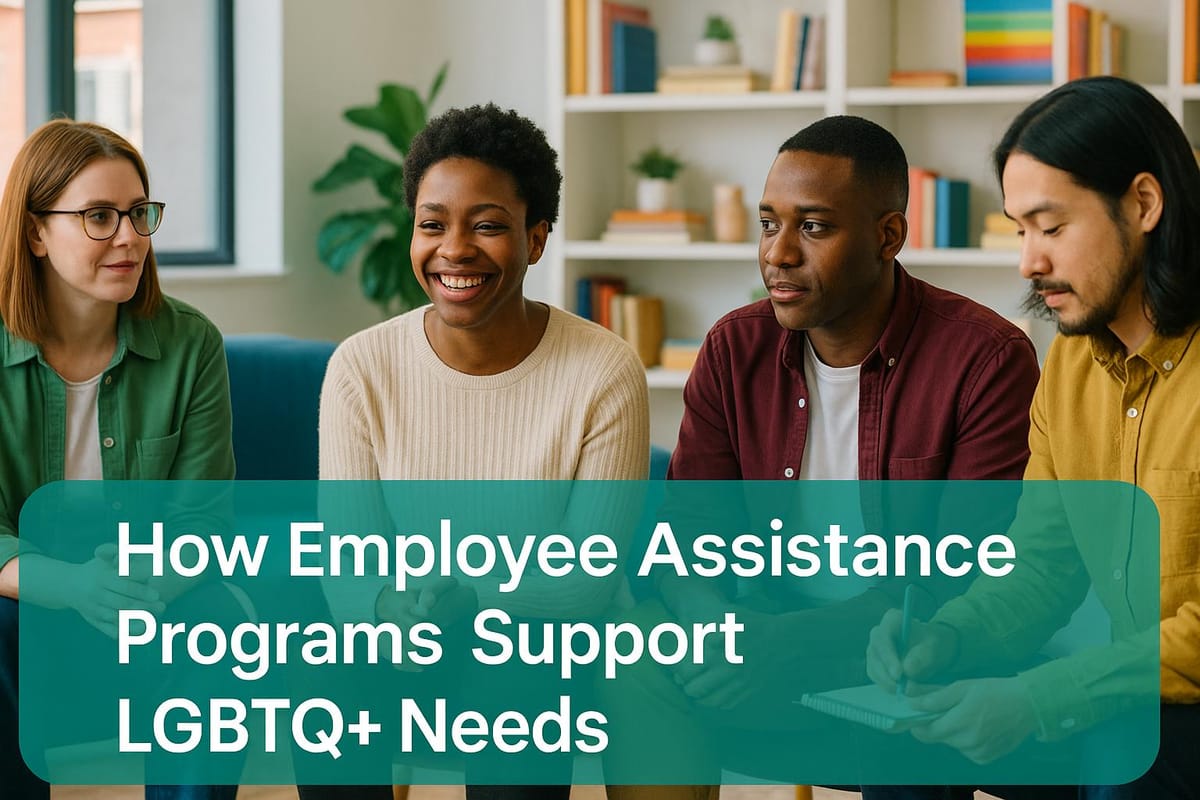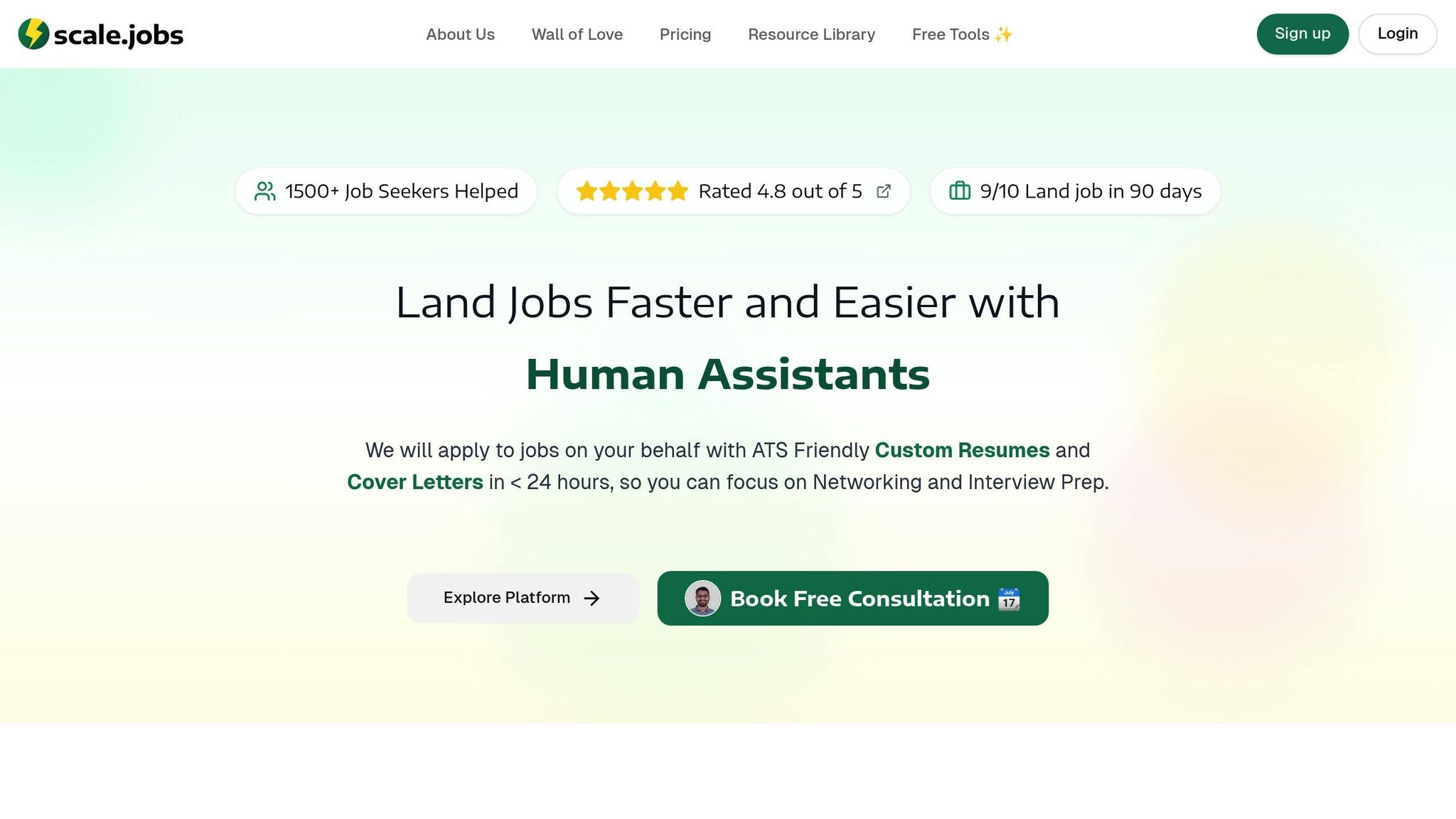How Employee Assistance Programs Support LGBTQ+ Needs
Explore how Employee Assistance Programs enhance support for LGBTQ+ employees, addressing mental health, discrimination, and family needs.

Employee Assistance Programs (EAPs) are a lifeline for employees facing personal and professional challenges. For LGBTQ+ employees, these programs can address unique issues like discrimination, mental health struggles, family rejection, and gender-affirming care. However, many EAPs fall short in providing tailored support. Here's how forward-thinking companies are stepping up:
- Mental Health Support: LGBTQ+ individuals face higher risks of anxiety, depression, and substance use. EAPs now offer affirming counseling and digital mental health tools to close these gaps.
- Discrimination Assistance: Confidential legal consultations, reporting channels, and advocacy services help employees navigate workplace discrimination.
- Family and Healthcare Support: Resources for adoption, surrogacy, and gender-affirming care are becoming more accessible through modern EAPs.
- Workplace Training: Programs for managers and teams focus on respectful communication, bias reduction, and allyship.
Why it matters: Companies with LGBTQ+-friendly EAPs see better retention, higher engagement, and reduced costs. With 21% of Gen Z identifying as LGBTQ+, offering meaningful support is no longer optional - it’s essential for attracting and retaining top talent.
Mental Health Support for LGBTQ+ Employees
Confidential Counseling Services
Counseling tailored to LGBTQ+ employees bridges the gap between general Employee Assistance Program (EAP) services and the unique challenges these employees face. LGBTQ+ individuals are at over twice the risk for mental health disorders and 2.5 times more likely to experience depression, anxiety, or substance use issues. These risks are often compounded by workplace discrimination, family rejection, and societal prejudice.
Today’s EAPs are stepping up with LGBTQ+-affirming counseling provided by specialists trained to address these specific challenges. For instance, Mass General Brigham’s EAP offers confidential support customized for LGBTQ+ employees and their families. This includes guidance on sensitive issues like coming out, gender transition, or workplace discrimination, areas where traditional counseling often falls short.
Affirmative therapy is key to validating LGBTQ+ identities and reducing the likelihood of clients dropping out early in the process. Research shows that clients are more likely to avoid or end therapy prematurely when therapists lack understanding of sexual and gender identity issues or show discomfort discussing LGBTQ+ topics.
Lam Benefits takes this a step further by offering up to seven free counseling sessions specifically designed to address LGBTQ+ mental health concerns. This approach highlights the importance of providing both immediate crisis intervention and ongoing support to close mental health gaps.
Confidentiality is crucial for LGBTQ+ employees, especially for those who are not open about their identity at work or fear discrimination. To protect privacy, EAPs ensure that counseling services operate independently from HR departments, meaning no details about session topics are shared with employers. Additionally, digital platforms now complement traditional counseling, further enhancing accessibility and privacy.
Digital Mental Health Tools
Digital platforms are transforming mental health support for LGBTQ+ employees by offering 24/7 access to confidential care, breaking down barriers often associated with traditional counseling services.
For example, Meditopia for Work provides multilingual expert support and mindfulness resources. The platform includes specialized therapy and coaching for individuals dealing with gender dysphoria, alongside a digital companion, SOUL, for ongoing guidance.
Modern Health integrates digital courses, meditations, certified coaching, and licensed therapy into a single app. This all-in-one approach makes it easier for employees to access the type of support that aligns with their comfort level and specific needs.
Spring Health combines traditional EAP services with advanced behavioral health solutions, offering psychotherapy, crisis support, and work-life management tools in one seamless system. Similarly, LifeSpeak delivers expert-led education on mental health and life skills, with content tailored to challenges like coming out and coping with homophobia.
These digital tools also help connect LGBTQ+ employees with employee resource groups and broader community networks, fostering inclusion and reducing feelings of social isolation. By providing culturally competent care and eliminating barriers to access, these platforms offer flexible and immediate support that meets the unique needs of LGBTQ+ employees.
Zander Keig: Trans US Veteran Mental Wellnes Coach
Fighting Discrimination and Building Workplace Support
Creating a supportive environment for LGBTQ+ employees goes beyond mental health initiatives. Tackling discrimination head-on and providing targeted training are essential steps in fostering a workplace where everyone feels safe and valued.
Support for Discrimination Issues
Workplace discrimination remains a harsh reality for many LGBTQ+ employees. In fact, 75% report daily negative interactions tied to their identity. Alarmingly, 40% of LGBTQ+ employees still feel the need to hide who they are at work, and 36% of those who are out have misrepresented their identity in the past year. To address these challenges, Employee Assistance Programs (EAPs) have expanded their services to include robust support for discrimination-related issues.
EAPs now provide confidential legal consultations focused on employment law and LGBTQ+ rights. These consultations guide employees on how to document incidents, understand their legal protections, and navigate the complaint process. The confidentiality of these services ensures employees can seek help without fearing retaliation.
Another critical feature is the availability of safe reporting channels, such as anonymous hotlines and secure online platforms. These tools are indispensable, especially considering that 57% of LGBTQ+ employees wish their workplace had clearer policies for addressing discrimination and other workplace issues.
EAPs also offer advocacy support, pairing employees with trained counselors who assist in navigating internal complaint procedures. These advocates are well-versed in both company policies and the unique challenges LGBTQ+ employees face, ensuring reports are handled with care and thoroughness. Additionally, documentation and case management services help employees organize evidence and maintain detailed records, which are essential for formal complaints or legal action.
While these safeguards address discrimination after it occurs, proactive training programs for managers and teams aim to prevent such incidents from happening in the first place.
Training for Managers and Teams
Effective training programs, driven by EAPs, equip managers and teams with the knowledge and tools to create a more inclusive workplace. With 52% of LGBTQ+ employees expressing a need for more training on these topics, such programs are not just helpful - they’re crucial.
LGBTQ+ competency training is a cornerstone of these efforts, covering key areas like terminology, unconscious bias, respectful communication, and pronoun usage. These sessions address the reality that 60% of LGBTQ+ employees have had to correct assumptions about their identities. By providing practical strategies, these programs promote more inclusive interactions in everyday workplace scenarios.
For managers, specialized training modules focus on leadership skills tailored to supporting LGBTQ+ team members. These sessions teach managers how to handle disclosure conversations, respond effectively to discrimination complaints, and foster a psychologically safe environment. Currently, only 35% of LGBTQ+ employees feel they can be their authentic selves at work, highlighting the need for this kind of focused leadership training.
Beyond initial workshops, EAPs offer ongoing educational resources to keep inclusivity top of mind. These include regular training sessions, lunch-and-learn events, and digital modules featuring case studies and role-playing exercises. Such resources help employees practice inclusive behaviors and apply what they’ve learned in real-world situations.
Lastly, allyship development programs train non-LGBTQ+ employees to actively support their colleagues. These programs stress that allyship goes beyond passive support - it involves speaking up against discriminatory comments, consistently using inclusive language, and standing by LGBTQ+ colleagues in difficult moments. To ensure these efforts lead to tangible improvements, organizations incorporate measurement and accountability tools, such as tracking participation rates, conducting surveys, and monitoring workplace climate changes. These steps help gauge whether training programs are truly making a difference for LGBTQ+ employees.
Family Support and Gender-Affirming Care
LGBTQ+ employees often encounter unique hurdles when it comes to starting families or accessing healthcare that aligns with their identities. To address these challenges, Employee Assistance Programs (EAPs) have expanded their offerings, going beyond conventional benefits to provide tailored support.
Family Support Services
Building a family as an LGBTQ+ individual often involves navigating a maze of legal, financial, and emotional complexities that traditional benefits may not address. Today’s EAPs are stepping up with specialized resources to help employees manage these challenges. In fact, 78% of LGBTQ+ employees believe their company’s leadership is committed to advancing diversity, equity, and inclusion efforts.
For example, some EAPs now include legal assistance for family formation. Stryker, through its partnership with Lyra Health, offers support for various family-building paths, including joint adoption, step-parent or single-parent adoption, and surrogacy. Similarly, Ally Financial provides up to $35,000 to employees pursuing adoption or surrogacy, recognizing the higher costs often faced by LGBTQ+ families.
"My team is laser focused on the things we can control and the benefits that we can provide for our employees and making sure that those benefits are inclusive and meeting the needs of employees."
- Gwen Gollmer, executive director of total rewards at Ally
EAPs also offer counseling services specifically designed to address the emotional challenges of family building. These services help employees navigate relationship stress, anxiety about legal processes, and the unique pressures LGBTQ+ couples may experience during their journey to parenthood.
Additionally, EAPs provide referrals to elder and childcare resources that cater to diverse family structures. This includes connecting employees with LGBTQ+-friendly childcare providers, support groups for LGBTQ+ parents, and resources for those caring for chosen family members who may not be legally recognized as relatives.
Beyond family support, EAPs are also helping employees access gender-affirming healthcare with greater ease.
Gender-Affirming Healthcare Navigation
Supporting gender affirmation is another critical area where EAPs are making a difference for LGBTQ+ employees. The process of finding qualified providers and understanding insurance coverage for gender-affirming care can be daunting, but specialized EAP services are helping employees navigate these complexities.
For instance, NVIDIA offers a dedicated Gender Affirmation Team through Cigna, available at 855-699-8990. This team assists employees in understanding their benefits, securing authorizations, and managing claims. Employees also receive one-on-one guidance to connect with the right services during their transition.
Legal support is another essential component. Stryker’s EAP, via Lyra Health, helps employees with name and gender marker changes on official documents, as well as other legal matters that may arise during their transition.
Mental health support plays a key role in gender-affirming care. Lam Research provides up to seven free professional counseling sessions for employees and their family members, along with additional resources to help manage everyday challenges.
EAPs also offer benefits advocacy services to clarify what health plans cover for gender-affirming treatments. This includes details on hormone therapy, gender confirmation surgeries, and ongoing medical care. Employees often discover they have access to more extensive coverage than they initially thought, but navigating the authorization process can require expert assistance.
Finally, EAPs streamline the search for specialized healthcare providers. They connect employees with networks of professionals experienced in transgender healthcare, ensuring these providers are both knowledgeable and covered by insurance.
"The biggest mistake companies make when creating benefit policies is unintentionally excluding LGBTQ+ individuals from health care and family-building coverage. Employers must grasp the full scope of benefits since traditional insurance summaries often fall short."
- Cynthia McEwen, vice president of people and DE&I at Progyny, a fertility benefits company based in New York City
How to Access and Request Better EAP Services
Many companies provide Employee Assistance Programs (EAPs), but not all of them cater effectively to the needs of LGBTQ+ employees. Understanding how to access these resources and advocate for improvements can make a meaningful difference in your workplace experience.
How to Access EAP Resources
Start by checking if your company’s EAP includes LGBTQ+-inclusive support. Look through your employee handbook for inclusive language around benefits like parental leave, adoption, and healthcare. Pay attention to terms like "spouse" or "partner" instead of gender-specific language that could exclude same-sex couples.
Another useful tool is your company’s Human Rights Campaign Corporate Equality Index rating. This index evaluates companies on their LGBTQ+ policies and practices. A high rating often indicates stronger support systems for LGBTQ+ employees. You can search for your employer’s rating on the HRC website to learn more about their policies.
To gain further insight, tap into your network. Reach out to current or former employees through platforms like LinkedIn or read reviews on sites like Glassdoor to hear about their experiences with the company’s inclusivity.
For specific questions, contact your HR department or the EAP provider directly. Most EAPs offer confidential hotlines that let you inquire about LGBTQ+-specific services anonymously. Ask about counselors with LGBTQ+ training, healthcare navigation, and other tailored services.
Many EAPs also feature online portals where you can explore available resources. Use search terms like "LGBTQ+", "gender-affirming", or "family formation" to locate relevant services. Some portals include sections dedicated to diversity and inclusion, making it easier to find what you need.
"LGBTQ+ individuals will be looking for a company that provides the benefits that they need, along with an inclusive culture. These inclusive benefits will reduce employees' stress or anxiety about certain issues. It might make them feel more welcomed and a greater sense of belonging to the company." - Julie Stich, Vice President of Content, International Foundation
If the available services don’t meet your needs, use this information as a foundation to push for better support.
Advocating for Better EAP Services
If the current EAP offerings fall short, it’s time to advocate for change. Begin by reviewing your company’s healthcare and insurance plans to identify gaps in coverage for LGBTQ+ employees. Look for areas where mental health, gender-affirming care, or family support services are lacking.
Engage with HR, diversity officers, or senior leaders who prioritize LGBTQ+ initiatives. Present a clear case for how enhanced EAP services can improve employee retention and reduce costs.
You might also consider joining or forming an Employee Resource Group (ERG) centered on LGBTQ+ issues. ERGs provide a collective voice that can advocate for changes such as integrating LGBTQ+-inclusive resources into new hire orientations, management training, and professional development programs. These groups highlight employee demand for better services, making it easier for leadership to allocate resources.
Take a stand for inclusivity in your workplace. This means addressing anti-LGBTQ+ comments when you hear them and explaining why such language is harmful. By advocating for a respectful environment, you help lay the groundwork for inclusive EAP services to thrive.
When proposing specific improvements, rely on data to strengthen your case. For instance, LGBTQ+ individuals are more than twice as likely to experience mental health challenges, including depression, anxiety, and substance misuse. Highlighting these statistics underscores the urgent need for comprehensive mental health support through EAPs.
Gather voluntary, self-identified demographic data from employees to show the size and needs of the LGBTQ+ community within your company. This data can help leadership understand the potential impact of inclusive programs.
Push for policy reviews to eliminate discrimination. Advocate for gender-neutral language in company materials, healthcare benefits aligned with current WPATH guidelines, and robust systems for reporting discrimination or harassment.
Keep in mind that 91% of Fortune 500 companies now include gender-identity protections in their nondiscrimination policies. Use this as a benchmark when discussing why your company should step up its efforts. Falling behind industry standards could lead to losing talent to more inclusive competitors.
Improving these services doesn’t just address immediate needs - it also reinforces your company’s dedication to creating a welcoming and supportive workplace for all employees.
Job Search Support for LGBTQ+ Career Transitions
LGBTQ+ individuals often face unique challenges during career transitions, particularly when searching for inclusive workplaces. Discrimination and the difficulty of identifying employers that genuinely prioritize diversity can make the job search process daunting. To address these hurdles, job search support must extend beyond traditional resources, ensuring inclusivity and support during these critical transitions.
How Scale.jobs Supports LGBTQ+ Jobseekers

Scale.jobs is designed to meet the specific needs of LGBTQ+ jobseekers by offering personalized, human-centered support to help them find inclusive employers. Similar to how inclusive Employee Assistance Programs (EAPs) tackle workplace issues, Scale.jobs focuses on making job transitions smoother and more inclusive.
- Hands-On Application Management: Virtual assistants manually handle applications to bypass automated filters and ensure candidates are represented authentically. This approach helps jobseekers connect with companies that uphold strong diversity values.
- Real-Time Communication: A direct WhatsApp line allows jobseekers to quickly ask questions about company culture, benefits, or specific policies, ensuring clarity and confidence.
- Proof-of-Work Transparency: Screenshots and updates keep jobseekers informed throughout the process, offering peace of mind and accountability.
Scale.jobs also stands out for its straightforward pricing. With packages starting at $199 for 250 applications and going up to $1,099 for more comprehensive services, jobseekers can manage their budgets effectively during career transitions. Unlike subscription-based models, this flat-fee system eliminates ongoing costs.
Additionally, Scale.jobs provides free tools to aid the job search, including an ATS resume checker, cover letter generator, and salary predictor. These resources help LGBTQ+ jobseekers present themselves confidently while staying true to their identities.
Scale.jobs vs. Other Job Platforms
Scale.jobs goes beyond the typical offerings of job platforms by blending technology with personalized insights, making it especially effective for LGBTQ+ jobseekers.
- Cost-Effective Pricing: While platforms like Teal HQ rely on recurring subscription fees, Scale.jobs offers a one-time flat fee, which can be more economical for intensive job searches.
- Personalized Assistance: Unlike LazyApply’s fully automated system, Scale.jobs provides virtual assistants who can identify companies with inclusive policies and tailor applications to highlight diversity-related experience.
- Transparency and Updates: Scale.jobs emphasizes clear communication, offering detailed updates and proof-of-work documentation, which helps jobseekers make informed decisions.
With compatibility across various platforms - from corporate ATS systems to niche job boards - Scale.jobs ensures applications reach a broad range of inclusive employers. The quick turnaround for customized resumes and cover letters combines efficiency with personal attention, a balance many competitors fail to achieve.
Another standout feature is the unused-credit refund policy, which adds financial security for users. Combined with its flat-fee model and human-powered approach, Scale.jobs offers LGBTQ+ jobseekers a reliable, supportive, and cost-effective way to navigate career transitions with confidence.
Conclusion: EAPs and LGBTQ+ Employee Support
Employee Assistance Programs (EAPs) play a crucial role in fostering inclusion, especially when you consider that 81% of LGBTQ+ employees face mental health challenges - 21% more than their non-LGBTQ+ counterparts. These numbers highlight the pressing need for strong, inclusive EAPs to create workplaces where everyone feels supported.
Inclusive EAPs don't just improve workplace culture - they also make a measurable financial difference. Companies with these programs see 22% higher employee satisfaction and retain 53% more LGBTQ+ employees, which could save organizations up to $9 billion annually. By addressing key issues like mental health, discrimination, harassment, and the unique needs of LGBTQ+ employees, such as gender-affirming care and diverse family support, these programs demonstrate a genuine commitment to employee wellbeing.
The workforce is evolving, and the numbers speak volumes: 11% of millennials and 21% of Gen Z identify as LGBTQ+. Companies that fail to adapt their EAPs risk losing out on top talent. Leading organizations like Google, Salesforce, and Accenture are proving that inclusive practices lead to stronger engagement, better retention, and higher productivity. By prioritizing comprehensive support systems, these companies are setting the standard for inclusion and belonging.
When EAPs are designed thoughtfully, they create environments where employees can truly thrive. In fact, 70% of LGBTQ+ staff are more likely to stay with employers who offer robust support. Beyond the workplace, platforms like Scale.jobs are stepping in to help LGBTQ+ professionals during career transitions, offering tailored guidance to find inclusive employers and navigate the job market. Together, inclusive EAPs and tools like these are reshaping the future of work for LGBTQ+ professionals, setting a higher bar for what it means to support diversity and inclusion.
FAQs
How can Employee Assistance Programs (EAPs) better support the mental health and unique challenges of LGBTQ+ employees?
To genuinely support LGBTQ+ employees, Employee Assistance Programs (EAPs) should focus on creating welcoming and affirming environments. This means providing resources that respect diverse identities, ensuring employees feel valued, and fostering spaces where open communication is encouraged. These efforts help build trust and make employees feel safe to share their concerns.
EAPs can also include resources specifically designed for LGBTQ+ individuals, such as mental health counseling that addresses the needs of diverse identities, support services for non-traditional family structures, and educational materials that promote understanding and inclusivity. Affirmative therapy, which validates and advocates for LGBTQ+ individuals, is especially effective in tackling challenges like workplace discrimination or mental health struggles. By integrating these practices, companies can ensure their EAPs truly support the well-being of all employees.
How can LGBTQ+ employees advocate for better support from Employee Assistance Programs (EAPs)?
LGBTQ+ employees have the power to push for workplace resources that better reflect their needs. For example, they can encourage employers to enhance Employee Assistance Programs (EAPs) by including services like confidential counseling, mental health support, and family assistance programs that respect and affirm diverse identities.
Advocating for workplace diversity training, supporting LGBTQ+ employee groups, and fostering open discussions about inclusivity are other valuable steps. Additionally, requesting regular feedback opportunities on EAP services can help ensure these programs stay relevant, accessible, and supportive for everyone.
How can digital mental health tools enhance traditional Employee Assistance Programs (EAPs) to better support LGBTQ+ employees?
Digital mental health tools bring a new dimension to traditional Employee Assistance Programs (EAPs) by offering 24/7 access, customized support, and judgment-free care designed specifically for LGBTQ+ employees. These tools create opportunities for real-time communication and provide care that respects diverse identities and experiences, addressing issues like mental health struggles, workplace bias, and family-related stress more effectively.
For instance, text-based therapy apps and platforms that sync with EAPs make support easy to access and discreet. These resources give LGBTQ+ employees a safe and private way to seek help that aligns with their individual needs and preferences.




